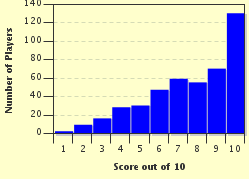Quiz Answer Key and Fun Facts
1. This line is from a famous poem by William Shakespeare and is very evocative of an extremely cold winter. This is the first line of the couplet. what came next?
'Blow, blow, thou winter wind,'
2. The first line in this couplet was taken from a poem by Ben Jonson. What came next?
'Drink to me only with thine eyes,'
3. Christopher Marlowe wrote lyrical and love poetry as well as the plays for which he is probably best remembered. One of these love poems has the opening line:
'Come live with me and be my love,'
What was the next line of verse?
4. Robert Louis Stevenson wrote several short poems and anthologies especially for young people. This first line is one of only two in such a poem. This is the first line, what was the second?
'The world is so full of a number of things,'
5. The famous Irish poet William Butler Yeats wrote one of my personal favourite poems from which I've taken this opening line. What line of verse follows?
'I will arise and go now, and go to Innisfree,'
6. This line of verse was written by Charles Wesley. What comes next?
'Gentle Jesus, meek and mild,'
7. William Shakespeare wrote many love poems. These lines are from one such love poem. This is the first line what comes next?
'O Mistress mine, where are you roaming?'
8. Percy Bysshe Shelley famously wrote 'The Skylark' from which this line of poetry is taken. What comes next?
'Hail to thee, blithe spirit!'
9. The poet William Wordsworth vigorously strode (we would probably say power walked today, I think) through the beautiful landscape of places like the Wye Valley as well as his beloved Cumberland Fells. He gave us this wonderfully evocative line which often flashes upon my inward eye. Can you tell me what line of verse follows this?
'I wander'd lonely as a cloud'
10. 'The Curfew tolls the knell of parting day,'
is the line of verse which opens one of the most famous poems in English Literature. What is the next line, do you know?
Source: Author
bracklaman
This quiz was reviewed by FunTrivia editor
agony before going online.
Any errors found in FunTrivia content are routinely corrected through our feedback system.

